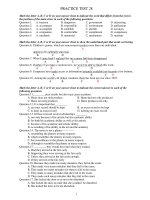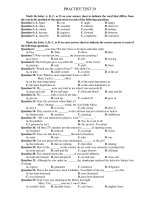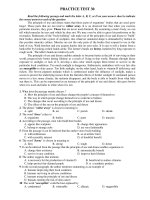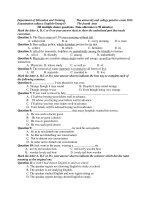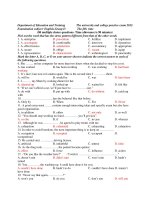Tài liệu Đề Thi Thử Đại Học Khối A1, D Anh Văn 2013 - Phần 5 - Đề 24 docx
Bạn đang xem bản rút gọn của tài liệu. Xem và tải ngay bản đầy đủ của tài liệu tại đây (45.02 KB, 6 trang )
1
PRACTICE TEST 27
Read the passage and circle the best option A, B, C, or D to complete the following questions or
statements:
Psychologist have debated a long time about whether a child’s upbringing can give it the
ability to do outstandingly well. Some think that it is impossible to develop genius and say that it is
simply something a person is born with. Others, however, argue that the potential for great
achievement can be develop. The truth lies somewhere between these two extremes.
It seems very obvious that being born with the right qualities from gifted parents will
increase a child’s ability to do well. However, this ability will be fully realized only with the right
upbringing and opportunities. As one psychologist says, “To have a fast car, you need both a good
engine and fuel.”
Scientists have recently assessed intelligence, achievement, and ability in 50 sets of identical
twins that were separated shortly birth and brought up by different parents. They found that
achievement was based on intelligence, and later influenced by the child’s environment.
One case involving very intelligent twins was quoted. One of the twins received a normal
upbringing, and performed well. The other twin, however, was brought up by extremely supportive
parents and given every possible opportunity to develop its abilities. That twin, though starting out
with the same degree of intelligence as the other, performed even better.
This case reflects the general principle of intelligence and ability. The more favorable the
environment, the more a child’s intelligence and ability are developed. However, there is no link
between intelligence and socioeconomic level of a child’s family. In other words, it does not matter
how poor or how rich a family is, as this does not affect the intelligence.
Gifted people can not be created by supportive parents, but they can be developed by them.
One professor of music said that outstanding musicians usually started two or three years earlier
than ordinary performers, often because their parents had recognized their ability. These musicians
then needed at least ten years’ hard work and training in order to reach the level they were capable
of attaining.
People who want to have very gifted children are given the following advice:
- Marry an intelligent person.
- Allow children to follow their own interests rather than the interests of the parents.
- Start a child’s education early but avoid pushing the child too hard.
- Encourage children to play; for example, playing with musical instrument is essential for a
child who wants to become an outstanding musician.
1: When scientists studied intelligence and ability in twins, they found that ______.
A. different twins generally have different levels of ability
B. ability depends mainly on intelligence and achievement
C. intelligence and development are irrelevant to ability
D. ability depends both on intelligence and environment
2: Scientists chose twins for their study because ______.
A. they have the same genetic background, usually with similar intelligence
B. they are born into the same family, hence the same upbringing
C. they have the same economic background and hence the same opportunities
D. each twin has the same environment as his/ her twin
3: How were great musicians different from ordinary musicians in their development?
A. They practice playing their instruments for many years
B. They were exceptionally intelligent and artistic
C. They concentrated on music to the exclusion of other areas
D. Their ability was realized at an early stage and then nurtured
4: The writer advises that gifted children should be allowed to follow ______.
A. only their interests in computer games B. only their interests in musical instruments
C. their own interests D. their parents’ interests
5: When encouraging their gifted children, parents should avoid ______.
A. letting them play their own way B. starting their education at an early age
C. pushing their children too hard D. permitting them to follow their own interests
2
6: The remark: “To have a fast car, you need both a good engine and fuel.” in the passage means
that in order to become a genius, ______.
A. you need to have good health and good nourishment
B. you need intelligence and you need to develop it
C. you should try to move quickly and efficiently.
D. you must nourish your brain and train your muscles hard
7: The word “favorable” in the passage mostly mean ______.
A. “of high quality or an acceptable standard”
B. “under the control or in the power of somebody else”
C. “good for someone and making him/ her likely to be successful”
D. “helping somebody to be more intelligent compared to the other people”
8: All of the following statements are true EXCEPT ______.
A. a child’s intelligence is influenced by that of his/ her parents
B. studying different twins is useful scientific procedure
C. educational development depends completely on economic well-being
D. to become successful, a child need both native intelligence and development
9: The upbringing of highly intelligent children requires ______.
A. parental support and encouragement B. an expensive education
C. wealthy and loving parents D. good musical instruments
10: The word “others” used in the first paragraph refers to ______.
A. other people B. other scientists C. other geniuses D. other children
Read the passage and circle the best option A, B, C, or D to complete the following questions or
statements:
Since the world became industrialized, the number of animal species that have either
become extinct or have neared extinction has increased. Bengal tigers, for instance, which once
roamed the jungles in vast numbers, now number only about 2,300. By the year 2025, it is estimated
that they will become extinct.
What is alarming about the case of the Bengal tiger is that this extinction will have been
caused almost entirely by poachers who, according to some sources, are not always interested in
material gain but in personal gratification. This is an example of the callousness that is contributing
to the problem of extinction. Animals such as the Bengal tiger, as well as other endangered species,
are valuable parts of the world’s ecosystem. International laws protecting these animals must be
enacted to ensure their survival – and the survival of our planet.
Countries around the world have begun to deal with the problem in various ways. Some
countries, in an effort to circumvent the problem, have allocated large amounts of land to animals
reserves. They then charge admission prices to help defray the costs of maintaining the parks, and
they often must also depend on world organizations for support. This money enables them to invest
in equipment and patrols to protect the animals. Another response to the increase in animal
extinction is an international boycott of products made from endangered species. This has had some
effect, but by itself it will not prevent animals from being hunted and killed.
11: What is the main topic of the passage?
A. Endangered species B. Problems with industrialization
C. The Bengal tiger D. International boycotts
12: The word “poachers” could be best replaced by which of the following?
A. Concerned scientists B. Enterprising researchers
C. Illegal hunters D. Trained hunters
13: The word “callousness” could be best replaced by which of the following?
A. incompetence B. indirectness C. insensitivity D. independence
14: The previous passage is divided into two paragraphs in order to contrast:
A. A comparison and a contrast B. A problem and a solution
C. A statement and an illustration D. Specific and general information
15: What does the word “this” refer to in the passage?
A. Bengal tiger B. Interest in material gain
C. Killing animals for personal satisfaction D. The decrease in the Bengal tiger population
3
16: Where in the passage does the author discuss a cause of extinction?
A. Lines 4-6 B. Lines 7-9 C. Lines 10-16 D. Lines 1-3
17: Which of the following could best replace the word “allocated”?
A. set aside B. combined C. taken D. organized
18: The word “defray” is closest in meaning to which of the following?
A. make a payment on B. raise
C. lower D. make an investment toward
19: What does the term “international boycott” refer to?
A. A global increase in animal survival
B. A refusal to buy animal products worldwide
C. Defraying the cost of maintaining national parks
D. Buying and selling of animal products overseas
20: Which of the following best describes the author’s attitude?
A. indifferent B. forgiving C. concerned D. surprised
Choose from the four options given (marked A, B, C, or D) one best answer to complete each of
the following sentences:
21: ______ did Arthur realize that there was danger.
A. When he entered the store B. After he had entered the store
C. On entering the store D. Only after entering the store
22: After seeing the movie Centennial, ______.
A. the book made many people want to read it
B. the book was read by many people
C. many people wanted to read the book
D. the reading of the book interested many people
23: Many of the current international problems that we are now facing ______.
A. are the results of misunderstandings.
B. lacks of the intelligent capabilities of understanding each other
C. linguistic incompetence
D. are because of not understanding themselves
24: Le: “I can’t understand how you missed the exit.”
Linh: “Well, it was so dark that ______.”
A. we could see hardly the road signs B. we could see the road signs hardly
C. hardly could we see the road signs D. we could hardly see the road signs
25: George didn’t do well in the class because ______.
A. he was a badly student B. he studied bad
C. he failed to study properly D. he was not good studywise
Read the passage and choose one word or phrase that best fits each of the gaps:
When you read something in a foreign language, you frequently come across words you do
not (26)______ understand. Sometimes you (27)______ the meaning in a dictionary and sometimes
you guess. The strategy you adopt depends very much upon the (28)______ of accuracy you require
and the time at your disposal.
If you are the sort of person who tends to turn to the dictionary frequently, it is (29)______
remembering that every dictionary has its limitations. Each definition is only an approximation and
one builds up an accurate picture of the meaning of a word only after meeting it in a (30)______ of
contexts. It is also important to recognize the special dangers of dictionaries that translate from
English into your native language and vice versa. If you must use a dictionary, it is usually far safer
to (31)______ an English-English dictionary.
In most exams you are not permitted to use a dictionary. (32)______ you are allowed to use one, it
is very time-consuming to look up words, and time in exams is usually limited. You are, (33)______
, forced to guess the meaning of unfamiliar words.
When you come across unknown words in an exam text, it is very easy to panic. However, if
you develop efficient techniques for guessing the meaning, you will (34)______ a number of
possible problems and help yourself to understand far more of the text than you at first thought
likely.
4
Two strategies which may help you guess the meaning of a word are: using contextual clues, both
within the sentence and outside, and making use of clues (35)______ from the formation of the
word.
26: A. wholly B. fully C. totally D. completely
27: A. inspect B. control C. check D. examine
28: A. extent B. level C. degree D. range
29: A. worth B. essential C. valuable D. vital
30: A. multiple B. variation C. variety D. diversity
31: A. survey B. consult C. refer D. inquire
32: A. In case B. Provided C. Although D. Even if
33: A. therefore B. so C. however D. so that
34: A. go over B. overcome C. get over D. surpass
35: A. coming B. extracted C. derived D. originated
Choose the best option A, B, C, or D to complete the following sentences:
36: She’d rather watch television, ______?
A. wouldn’t she B. didn’t she C. hadn’t she D. doesn’t she
37: If you give me a hand, then I shall be able to finish the work more quickly.
A. do me a favour B. take my fingers C. stand by me D. pick me up
38: There has been a sharp _____ in the number of burglaries in this area recently.
A. increase B. surge C. result D. advance
39: She wants to go shopping, but she has hardly ______.
A. no money B. some money C. little money D. any money
40: General ______ learning a foreign language is interesting, but not easy.
A. spoken B. speaking C. speak D. speaks
41: Staying in a hotel costs ______ renting a room in a dormitory for a week.
A. twice as much as B. as much twice as C. twice more than D. as much as twice
42: ______ had the curtain been raised than the light went out.
A. Only when B. Scarcely C. Hardly D. No sooner
43: Peter: “I enjoy listening to pop music.”
Maria: “______.”
A. I don’t B. I’m, too C. Neither do I D. So am I
44: The change in timetable will ______ many students having to catch an earlier bus
A. mean B. lead C. result D. cause
45: Man’s use of colours ______ back to the time when men first used red and yellow clays to paint
their bodies.
A. had dated B. dating C. dated D. dates
46: They were fortune ______ from the fire before the building collapsed.
A. to rescue B. to have rescued C. rescuing D. to have been rescued
47: Jim ______ care of himself. He left home when he was 16 and has been on his own since then.
A. used to take B. is used to take C. is used to taking D. used to be taken
48: If coastal erosion continues to take place at the present rate, in another fifty years this beach
______.
A. won’t be existing B. doesn’t exist C. isn’t going to exist D. isn’t existing
49: These days women are not expected to stay at home ______ their mothers did in the past.
A. such as B. like C. as if D. as
50: Due to the storm, the flight to New York was ______ for some hours.
A. cancelled B. delayed C. stopped D. given up
51: The twins look so much alike that almost no one can ______ them ______.
A. tell – away B. take – on C. tell – apart D. take – apart
52: A: “When is Mr. Fields planning to retire?”
B: “Soon, I think. He ______ here for a long time. He will probably retire either next year or
the year after that.”
A. had been working B. is working C. has been working D. worked
53: They have made no ______ at all in our talk about a common agricultural policy.
A. gain B. progress C. profit D. success
5
54: She is not a teenager any more. She looks quite ______ now.
A. grown-up B. overgrown C. outgrown D. grown through
55: ______ of his childhood home in Hannibal, Missouri, provided Mark Twain with the inspiration
for two of his most popular novels.
A. He remembered B. Remembering C. Memories D. It was the memories
56: Jennifer is ______ in asking for bigger salary. She has worked really hard.
A. unreasonable B. reason C. reasonable D. reasonably
57: John has been looking for his car, ______ is light blue
A. whose its colour B. the colour of which C. of which colour D. which colour
58: We would contact your nearest relative ______ any accident occurring.
A. in place of B. in spite of C. on account of D. in the event of
59: Let’s begin our discussion now, ______?
A. will we B. don’t we C. won’t we D. shall we
60: ______ in astronomy, the discovery of Uranus was by accident.
A. Alike many finds B. Many alike finds
C. It was like many finds D. Like many finds
61: Don’t try too hard. Don’t ______ off more than you can ______
A. eat – swallow B. eat – chew C. bite – swallow D. bite - chew
62: ______ you read the instructions carefully, you will understand what to do.
A. Provided B. As much as C. As well as D. As far as
63: Ben would have studied medicine if he ______ to a medical school.
A. was admitted B. had been admitted C. had admitted D. would be able to enter
64: Brenda: “Do you think it will rain?’
Carol: “Oh! ______.”
A. I don’t hope B. I don’t hope so C. It’s hopeless D. I hope not
65: ______ having a well-paid job, she never has any money.
A. Let alone B. Despite C. For D. Even though
Choose one word marked A, B, C, or D whose stress pattern is different from the others in each
group:
66: A. miraculous B. diversity C. platoon D. occupation
67: A. delivery B. ornamental C. climatic D. environment
68: A. ancestor B. tragedy C. geology D. accurate
69: A. interview B. satellite C. similar D. contestant
70: A. magnificent B. photography C. proverbial D. advantageous
Circle one option A, B, C, or D that best rewrites each of the following sentences:
71: The robbers made the bank manager hand over the money.
A. The bank manager was forced to hand over the money by the robbers.
B. The bank manager was allowed to hand over the money by the robbers.
C. The bank manager was made hand over the money by the robbers.
D. The robbers helped the bank manager to hand over the money.
72: It was only because his wife helped him that he was able to finish his book.
A. Without his wife’s help, he couldn’t have finished his book.
B. If it weren’t for his wife’s help, he couldn’t have finished his book.
C. If only he had been able to finish his book.
D. But for his wife’s help, he couldn’t finish his book.
73: “Sorry, Madam. Looking after the garden is not my duty.”
A. He apologized for not looking after the garden.
B. He not promised to look after the garden.
C. He said that he was not responsible for looking after the garden.
D. He asked if looking after the garden was his duty.
74: Scientists say forests are being destroyed by air pollution.
A. Forests are said to be destroyed by scientists.
B. Scientists blame air pollution for the destruction of forests.
C. Scientists are blamed for destroying forests.
6
D. Scientists say there’s much air pollution in the forests.
75: Much as he loved her, he couldn’t forgive her for what she had done.
A. He didn’t forgive her for what she had done despite loving her very much.
B. He loved her so much, that’s why he forgave her for what she had done.
C. He didn’t forgive her for what she had done as he loved her very much.
D. She loved him very much, so he forgave her for what she had done.
Identify one underlined part that is incorrect in each of the following sentences by circling the
corresponding letter A, B, C, or D :
76:
Dogs that are trained to lead the blind must be loyalty, intelligent and calm.
A B C D
77:
Since erecting in 1886, the Statue of Liberty has served as a symbol of freedom.
A B C D
78:
Food prices have raised so rapidly in the past few months that some families have been
A B C
forced to alter their eating habits.
D
79:
What we know about certain diseases are still not sufficient to prevent them from spreading
A B C
easily among the population.
D
80:
The president refused to accept either of the four new proposals made by the contractors.
A B C D


